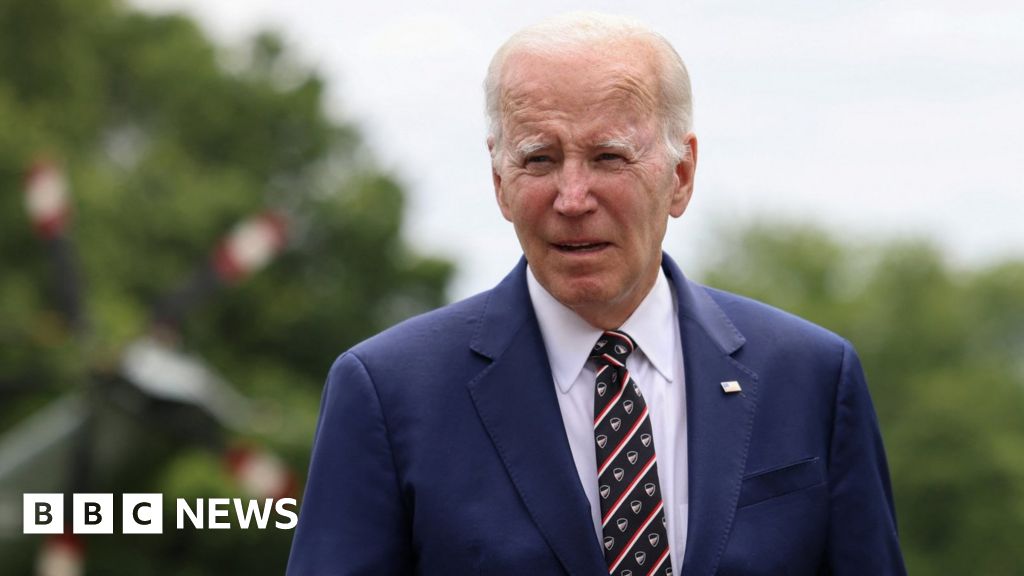US Debt Ceiling Deal Ready For Congress Vote, Joe Biden Says

President Joe Biden (left) with Republican House Speaker Kevin McCarthy
President Joe Biden has said a bipartisan deal to raise the US debt ceiling and avert a fast-approaching default is ready to move to Congress.
He said on Sunday the agreement was a "compromise", while Republican House Speaker Kevin McCarthy earlier called it "worthy of the American people".
They must now convince members of Congress to approve it.
The proposed deal is the result of long and bitter negotiations between Democrats and Republicans.
The Treasury had warned the US will run out of money on 5 June without a deal.
The US must borrow money to fund the government because it spends more than it raises in taxes.
Republicans have been seeking spending cuts in areas such as education and other social programmes in exchange for raising the $31.4tn (£25tn) debt limit.
At a brief appearance before reporters on Sunday evening, President Biden said the proposed deal was "a really important step forward".
"It takes a threat of catastrophic default off the table, protects our hard earned and historic economic recovery.
"And the agreement also represents a compromise which means no one got everything they want, but that's the responsibility of governing."
Mr Biden said he believed Mr McCarthy had negotiated in "good faith" and now had the votes for the deal to be backed in Congress.
It envisages that non-defence government spending would be kept largely flat for two years and then rise by 1% in 2025.
There would be no major changes to Medicaid health insurance, and the proposed agreement fully funds medical care for veterans.
Laws are to be streamlined to speed up approval time for new energy projects - a reform Republicans have been pushing for.
Covid relief funds that have not been spent will be clawed back in the agreement, another demand made by the Republicans.
Certain age changes are proposed for a government programme that provides food-purchasing assistance for people on low or no incomes.
Late on Saturday, news came of a tentative deal - but it took until Sunday for negotiations to continue and the agreement to be finalised.
Mr McCarthy on Saturday said these reforms would lift people out of poverty and into the workforce. He added: "There are no new taxes, no new government programmes."
But he now faces a challenge to push it through the House, where it may be opposed by some diehards among both Republicans and Democrats.
Mr McCarthy said more than 95% of House Republicans were very excited about the deal.
But some have already broken ranks - Republican Chip Roy of Texas said he and some others were going to try to stop it passing.
Republicans control the House by 222 to 213, while Democrats control the Senate by 51 to 49.
A US default would upend the US economy and disrupt global markets.
In the US, the immediate effect would be that the government would quickly run out of funds to pay for welfare benefits and other support programmes, for instance.
Over a long period, the crisis would tip the US economy into recession - and this would result in unemployment rising.
A US recession would have big knock-on effects for many countries around the world, for which the US is a key trading partner - they would not be able to sell to an economy that does not buy as much.
And because the US dollar is the reserve currency of the world, a default would send panic across the world, eventually leading to prices of many commodities rising.
From Chip War To Cloud War: The Next Frontier In Global Tech Competition
The global chip war, characterized by intense competition among nations and corporations for supremacy in semiconductor ... Read more
The High Stakes Of Tech Regulation: Security Risks And Market Dynamics
The influence of tech giants in the global economy continues to grow, raising crucial questions about how to balance sec... Read more
The Tyranny Of Instagram Interiors: Why It's Time To Break Free From Algorithm-Driven Aesthetics
Instagram has become a dominant force in shaping interior design trends, offering a seemingly endless stream of inspirat... Read more
The Data Crunch In AI: Strategies For Sustainability
Exploring solutions to the imminent exhaustion of internet data for AI training.As the artificial intelligence (AI) indu... Read more
Google Abandons Four-Year Effort To Remove Cookies From Chrome Browser
After four years of dedicated effort, Google has decided to abandon its plan to remove third-party cookies from its Chro... Read more
LinkedIn Embraces AI And Gamification To Drive User Engagement And Revenue
In an effort to tackle slowing revenue growth and enhance user engagement, LinkedIn is turning to artificial intelligenc... Read more

